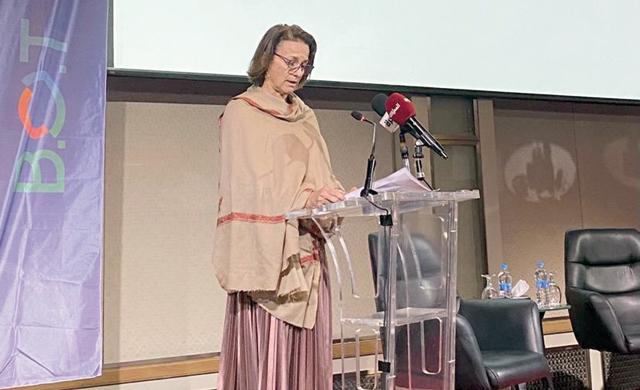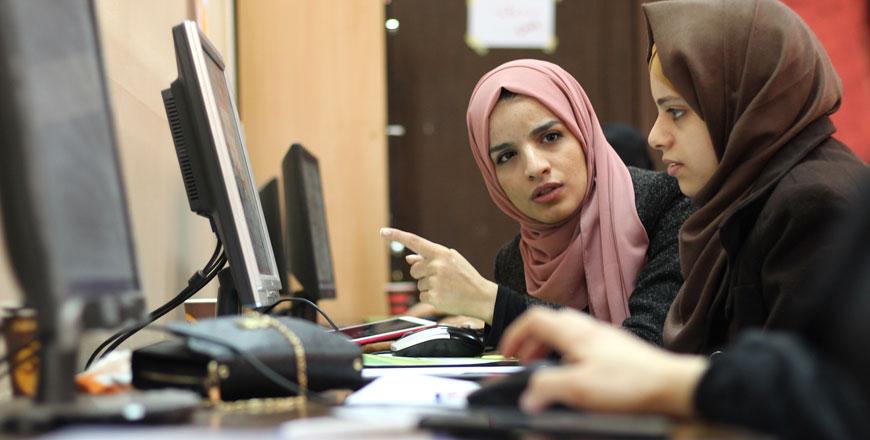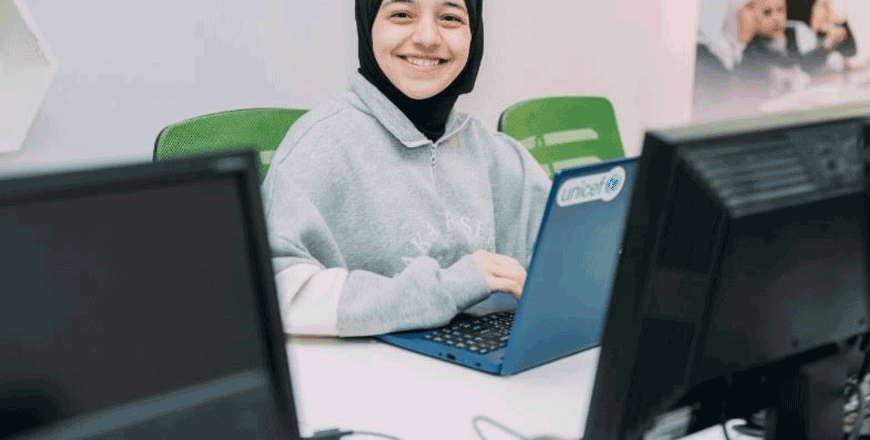You are here
UNICEF launches digital platform connecting vulnerable communities with employment opportunities
By Batool Ghaith - Mar 23,2022 - Last updated at Mar 23,2022

Representative of UNICEF Jordan Tanya Chapuisat speaks during the launch of the Bridge, Outsource, Transform (B.O.T.) Impact Sourcing platform on Wednesday (Photo courtesy of UNICEF)
AMMAN — Since 2019, UNICEF’s “Digital Skills for A Better Future” programme has trained more than 3,000 young people, 70 per cent of whom were women, across nine governorates, according to UNICEF Jordan.
A total of 560 trainees were provided with work placement opportunities, and others found remote freelance opportunities through the Bridge, Outsource, Transform (B.O.T.) digital platform, generating more than JD9,000 of income in 2021, UNICEF stated.
UNICEF and Digital Opportunity Trust Jordan (DOT) on Wednesday launched the B.O.T. Impact Sourcing platform, connecting skilled freelancers from vulnerable communities with digital micro-employment opportunities, which is the first impact sourcing platform in Jordan, the UN agency said.
The B.O.T. platform is part of the UNICEF “Digital Skills for A Better Future” programme, aimed to equip vulnerable youth aged 17-24, with demand driven digital skills for better income generation opportunities, and a smooth transition into productive adulthood, during a presentation during the event.
The B.O.T. platform, funded by the Prospects Partnership from the Government of the Netherlands, enhances vulnerable youth (Jordanians and refugees), especially young women’s livelihoods through enabling them to access micro tasking opportunities in the digital sector. This access is particularly relevant for vulnerable youth, whose access to the formal labour market is limited by their gender, location, and socio-economic status, the launching event heard.
The programme design was based on an in-depth analysis of the Jordanian labour market needs, equipping young people with basic and advanced digital skills trainings, to empower them to access different employment opportunities, whether freelancing, micro works, or full-time employment, according to a UNICEF statement.
Ahmad Hanandeh, Minister of Digital Economy and Entrepreneurship, said that the B.O.T. platform is aligned with the ministry’s role of enhancing youth digital skills and prepare them for the labour market.
According to UNICEF Jordan Representative Tanya Chapuisat, UNICEF’s “Digital Skills for A Better Future” programme addresses geographic, economic and social factors to close the digital gap, facilitating access to meaningful employment opportunities, with a focus on women and people with disabilities.
“Ensuring access of young people to services and productive assets that will better facilitate their transition to work is a priority in the UN 2030 youth strategy,” Chapuisat said.
Ala’a Samer, a 23-year-old Syrian living in Jordan, started training with B.O.T. in October 2021, as he was facing difficulties finding job opportunities.
“My experience was very enriching as I gained skills and knowledge through the multiple trainings and courses I undertook from home, which was also great. I have received a great evaluation, which motivated me to continue and B.O.T. provided me with a 3-month work contract,” Samer told The Jordan Times during an interview, noting that the freelance opportunities he got were his main source of income.
Samer noted that he will be starting a new project with B.O.T. soon.
Twenty-two-year-old Jordanian Marwa Raed started with B.O.T. in her last year of university, which was during the COVID-19 lockdown.
“During the lockdowns, I wanted to use my time in something productive and beneficial for me, which is how I got into B.O.T. and started training online for different basic skills, which helped me find many freelance opportunities,” Raed told The Jordan Times.
Related Articles
AMMAN — On World Youth Skills Day, observed on July 15, UNICEF and Digital Opportunity Trust (DOT) have announced their partnership to deliv
AMMAN — On the occasion of International Women’s Day, UNICEF affirmed its commitment to advancing young women’s access to digital learning o
AMMAN — UNICEF and Injaz signed a joint “Volunteering Incentives Programme” agreement to provide vulnerable youth with access to volunteer o


















